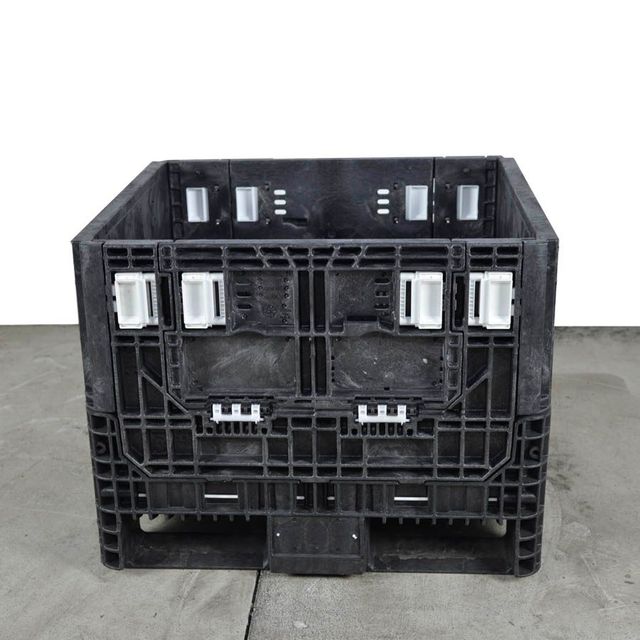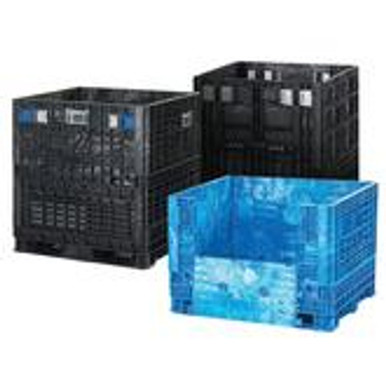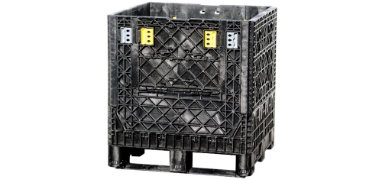A complete guide to used collapsible bulk containers for efficient transport and storage
Why Bulk Containers Are Necessary for Cost-efficient and lasting Transport
Mass containers play a vital role in modern-day logistics. They help with the efficient motion of big quantities of goods, thereby maximizing transportation procedures. This approach not only decreases costs however additionally lessens environmental effect with reduced exhausts and waste generation. As industries look for more lasting practices, the adoption of mass containers is becoming significantly considerable. What ramifications does this shift hold for future logistics and supply chain monitoring?

The Advantages of Utilizing Mass Containers in Logistics
Bulk containers transform logistics by enhancing efficiency and sustainability. These containers permit for the transportation of big quantities of goods in a single journey, significantly decreasing the number of trips needed. This not only enhances operations yet likewise decreases labor costs associated with handling, filling, and dumping. Additionally, bulk containers are created to enhance area application within transport automobiles, ensuring that more products can be shipped concurrently.
The standardization of bulk containers also simplifies the logistics procedure. With consistent dimensions, they can be quickly piled and saved, bring about boosted storehouse administration. Bulk containers often include long lasting products that secure materials from damages throughout transit, consequently lowering item loss and enhancing general reliability. Consequently, organizations can experience enhanced supply chain efficiency, ultimately leading to increased productivity and consumer fulfillment. This mix of variables makes bulk containers a critical possession in modern logistics.
Ecological Influence: Minimizing Waste and Carbon Footprint
As sectors increasingly prioritize sustainability, the fostering of bulk containers has arised as a crucial technique for minimizing waste and reducing carbon footprints. These containers lessen the use of packaging materials, such as boxes and plastic, consequently especially reducing general waste generation. By combining shipments, mass containers enhance transportation performance, permitting more items to be transferred per trip. This decrease in journeys directly associates with reduced greenhouse gas discharges, adding to a smaller carbon footprint.
Furthermore, bulk containers can usually be recycled or recycled, further mitigating ecological effect. The toughness of these containers guarantees they can hold up against several transportation cycles, lowering the requirement for single-use choices. used collapsible containers. By improving logistics and promoting reliable source usage, mass containers not just support sustainable practices but likewise motivate sectors to align with global ecological goals. Inevitably, their application mirrors a commitment to environmental stewardship and liable resource administration
Cost Savings: Just How Bulk Containers Lower Transportation Costs
While several firms look for ways to boost their profits, using bulk containers offers a significant chance for reducing transport expenses. Mass containers optimize the quantity of items delivered, allowing services to ship bigger quantities simultaneously. This efficiency lowers the number of journeys needed, straight reducing gas prices and decreasing labor expenditures connected with loading and dumping.
In addition, mass containers often include structured styles that enhance space use within transportation automobiles. This suggests fewer voids, leading to a lot more reliable usage of readily available capability. The sturdiness of mass containers can decrease the danger of item damages throughout transit, guaranteeing and lowering losses that more products arrive undamaged.
Enhancing Supply Chain Performance With Bulk Storage Solutions
Bulk storage space solutions play an essential function in improving supply chain performance by maximizing stock administration. By settling goods into less, bigger containers, businesses can significantly reduce managing expenses related to frequent transfers and handling. This streamlined technique enables far better monitoring and management of supply, inevitably bring about improved functional efficiency.
Streamlined Stock Monitoring
Effective stock monitoring is vital for maximizing supply chain operations, especially when organizations embrace bulk storage options. These remedies make it possible for services to keep greater supply degrees while minimizing the frequency of replenishment. By consolidating materials into mass containers, companies can streamline their stock procedures, decreasing the complexity connected with tracking numerous smaller sized bundles. This strategy facilitates accurate inventory matters and boosts forecasting precision, permitting even more informed decision-making. Additionally, mass storage space remedies simplify storehouse organization, making it less complicated to locate and gain access to items when required. Consequently, companies can attain an extra effective stock turnover price, eventually boosting total supply chain efficiency and reducing the possibility of stockouts or overstock circumstances.

Minimized Handling Costs
The implementation of bulk storage options not only enhances supply monitoring but additionally considerably minimizes managing prices across the supply chain. By consolidating materials right into bulk containers, companies minimize the requirement for constant handling and transfer between different storage space and transportation units. This method reduces down on labor prices related to loading, dumping, and moving smaller sized packages. In addition, mass storage space reduces the frequency of deliveries, bring about reduced transportation prices and lowered fuel consumption. As an outcome, services can enhance their logistics operations, permitting a much more reliable appropriation of resources. Eventually, decreased handling costs add to boosted general supply chain effectiveness, fostering an environment that sustains both sustainability and financial stability.

Adaptability of Mass Containers Across Different Industries
Although lots of industries have distinctive requirements for transport and storage space, mass containers have actually become a versatile remedy that meets a large range of needs. These containers, varying from huge bins to specialized tanks, can fit diverse materials, including granules, powders, and liquids. In the agricultural market, mass containers promote the transport of plant foods and grains, while the food and drink industry uses them for ingredients and finished items. The chemical industry relies on mass containers for safely delivering dangerous materials, guaranteeing compliance with safety and security guidelines. Additionally, building firms take advantage of bulk containers for delivering aggregates and various other materials. Their flexibility encompasses various modes of transport, consisting of ships, trains, and vehicles, enhancing logistical effectiveness. This flexibility not just streamlines operations across various fields yet likewise advertises sustainability by decreasing packaging waste and enhancing room en route. As a result, bulk containers play a necessary duty in modern-day supply chain management.
Future Fads wholesale Container Usage and Sustainability
The future of bulk container usage is progressively formed by innovative materials advancement that boosts sustainability. Furthermore, automation in logistics assures to enhance operations, reducing waste and improving efficiency. Welcoming circular economic situation techniques will certainly even more change exactly how bulk containers are created, used, and recycled, cultivating a much more sustainable transport landscape.
Ingenious Products Development
As industries significantly prioritize sustainability, innovative products growth wholesale containers becomes a significant aspect in enhancing green transportation services. Researchers and suppliers are exploring eco-friendly plastics, recycled compounds, and light-weight steels to minimize ecological effect. These products not just decrease waste yet additionally enhance fuel performance by reducing the total weight of containers. In addition, advancements in clever materials, which can adapt to varying conditions, enhance the durability and functionality of bulk containers. The integration of these cutting-edge products straightens with circular economic climate concepts, advertising reuse and recycling. As the demand for sustainable techniques grows, the advancement of such materials will certainly play an important role in forming the future of mass container usage in logistics and transport.
Automation in Logistics
Substantial advancements in automation are poised to transform logistics and the usage of mass containers, enhancing sustainability in transportation. Automated systems, consisting of drones and self-governing cars, are improving the movement of bulk containers, decreasing the reliance on traditional fuel-powered transport. These technologies optimize transmitting and loading processes, improving and lessening empty miles gas performance. Additionally, automated inventory administration systems enhance tracking and surveillance of bulk containers, making certain much better resource allowance and decreased waste. The assimilation of the Web of Points (IoT) allows more info real-time information analysis, allowing positive decision-making that lines up with sustainability goals. As automation remains to evolve, it is expected to drive further advancements in mass container use, ultimately supporting even more lasting logistics methods and decreasing the ecological influence of transport.
Round Economic Situation Practices
Advancements in automation are establishing the phase for an extra incorporated technique to circular economy methods in the domain of bulk container use. As markets progressively accept sustainability, bulk containers are being developed for longevity and reusability. This change not only decreases waste but likewise improves source performance. Firms are adopting techniques such as closed-loop systems, where used containers are collected, reconditioned, and reintroduced right into the supply chain. In addition, wise innovations track container life cycles, promoting far better monitoring and reducing ecological impact. The partnership in between makers, logistics service providers, and end-users is vital in establishing standards for sustainable container usage. used collapsible bulk containers. Future patterns show a growing focus on products that are naturally degradable and recyclable, more enhancing the circular economy's concepts wholesale transportation

Often Asked Concerns
What Materials Are Bulk Containers Typically Made From?
Mass containers are generally created from resilient products such as high-density polyethylene, steel, aluminum, and cardboard. These materials give toughness, security, and flexibility, making them suitable for transferring different items in different industries successfully.
How Do I Pick the Right Dimension Bulk Container?
Selecting the appropriate dimension mass container involves examining the volume of products to be transferred, considering handling tools compatibility, and assessing storage room needs. Appropriate size warranties effectiveness in transport and minimizes waste throughout shipment.
Are Bulk Containers Reusable or Recyclable?
Mass containers are typically reusable, created for several journeys, improving sustainability. Lots of can additionally be reused, depending on the products used. Picking recyclable alternatives further supports environmental goals and minimizes waste in transport techniques.
What Safety And Security Regulations Relate To Mass Container Transport?
Safety and security guidelines for mass container transportation include conformity with the Department of Transportation guidelines, proper labeling of hazardous materials, structural integrity assessments, and adherence to weight restrictions to guarantee safe handling and avoid mishaps throughout transit.
How Can Organizations Transition to Utilizing Mass Containers Effectively?
Companies can alter to bulk containers by reviewing existing logistics, educating team on handling, purchasing suitable devices, optimizing inventory monitoring, and teaming up with vendors to assure compatibility and efficiency throughout the supply chain.
As industries progressively prioritize sustainability, the fostering of mass containers has actually emerged as a vital strategy for decreasing waste and decreasing carbon footprints. By settling materials into bulk containers, firms can simplify their inventory processes, decreasing the complexity associated with tracking numerous smaller packages. As sectors increasingly prioritize sustainability, ingenious materials advancement in mass containers emerges as a significant element in improving environment-friendly transportation solutions. Automated systems, including drones and self-governing vehicles, are simplifying the activity of bulk containers, lowering the reliance on traditional fuel-powered transportation. Furthermore, automated stock monitoring systems boost monitoring and surveillance of bulk containers, guaranteeing better source allowance and minimized waste.